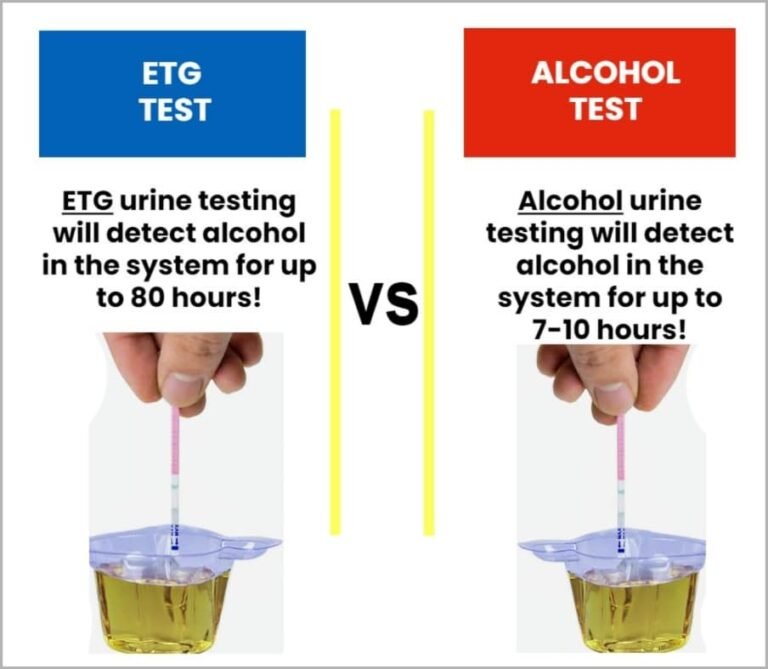Introduction to ETG Alcohol Testing
ETG, or Ethyl Glucuronide, is a direct metabolite of ethanol, the intoxicating agent in alcoholic beverages. Unlike ethanol, which is rapidly metabolized and eliminated from the body, ETG remains detectable for a longer period, making it a reliable biomarker for recent alcohol consumption. ETG alcohol testing is therefore widely utilized to ascertain whether an individual has consumed alcohol within a specific timeframe.
The science behind ETG testing lies in its sensitivity and specificity. ETG is formed in the liver when ethanol undergoes glucuronidation, a biochemical process where glucuronic acid combines with substances to facilitate their excretion. This metabolite is highly specific to ethanol, significantly reducing the likelihood of false positives from other substances. ETG’s high sensitivity allows for the detection of even low levels of alcohol consumption, which makes it particularly useful in various legal and clinical settings.
One of the key advantages of ETG testing is its extended detection window. While ethanol itself can be detected in the blood for only a few hours after consumption, ETG can be detected in different types of specimens for varying durations. In urine, ETG can typically be detected for up to 80 hours post-consumption, though this window can vary based on the amount of alcohol consumed and individual metabolic differences. In hair, ETG can be detected for up to 90 days, providing a longer-term view of an individual’s alcohol use. Blood tests for ETG are less common but can offer insights within a shorter detection window similar to that of urine.
ETG testing can be conducted using various types of specimens, each with its own advantages. Urine testing is the most common and is favored for its non-invasive nature and longer detection window. Hair testing, while more costly, offers the benefit of detecting alcohol use over a more extended period. Blood testing is less frequently used but can provide immediate information about recent alcohol consumption. These multiple testing options make ETG a versatile tool in monitoring alcohol use for legal, clinical, and personal purposes.
The Process of ETG Alcohol Testing
ETG (ethyl glucuronide) alcohol testing is a reliable method used to detect recent alcohol consumption. The process begins with the collection of a biological specimen, which can be urine, blood, hair, or even nails, although urine is the most commonly used. Proper sample collection is paramount to ensure the accuracy of the test results and to avoid contamination or false positives. The specimen is usually collected in a controlled environment, following strict protocols to maintain the integrity of the sample.
Once the specimen is collected, it is labeled and securely transported to a laboratory for analysis. In the laboratory, the sample undergoes initial screening using immunoassay techniques. Immunoassays are biochemical tests that measure the presence or concentration of ETG in the sample through antigen-antibody reactions. This initial screening is highly sensitive and can detect ETG at very low levels, making it a useful tool for identifying recent alcohol consumption.
If the immunoassay screening yields a positive result, confirmatory testing is conducted to rule out any potential false positives. The confirmatory test typically employs gas chromatography-mass spectrometry (GC-MS), a sophisticated analytical method that provides a more accurate and specific measurement of ETG. GC-MS separates the chemical components of the sample and identifies them based on their mass-to-charge ratio, ensuring precise quantification of ETG.
Handling and storage of the specimen are also critical factors in the ETG testing process. Samples must be stored at appropriate temperatures and conditions to prevent degradation or contamination. Chain-of-custody procedures are meticulously followed to document the sample’s journey from collection to analysis, ensuring that the results are legally defensible in court.
In summary, the ETG alcohol testing process involves meticulous specimen collection, initial screening through immunoassay, and confirmatory testing via GC-MS. Proper handling and storage of the specimen are crucial to maintaining the integrity of the test results, which play a critical role in various legal processes in Florida courts.
Applications of ETG Alcohol Testing in Legal Processes
ETG alcohol testing has become a critical tool within the legal frameworks of Florida courts, particularly in cases where alcohol consumption is a significant concern. This form of testing is widely utilized in probation and parole monitoring, child custody disputes, DUI cases, and various other legal situations. Its ability to detect even low levels of alcohol metabolites in the body makes it an effective method for ensuring compliance with court-ordered abstinence from alcohol.
In probation and parole contexts, ETG testing serves as a cornerstone for monitoring individuals who are required to abstain from alcohol use as part of their conditions. Regular testing helps probation officers verify compliance, providing concrete evidence that can either support or challenge the individual’s adherence to their probation terms. A positive ETG test can lead to consequences such as extended probation periods, additional court hearings, or incarceration.
Child custody cases often hinge on the fitness of a parent to provide a safe environment for their children. In scenarios where alcohol abuse is alleged, ETG testing can provide objective data to support or refute claims of sobriety. Courts rely on these test results to make informed decisions about custody arrangements, visitation rights, and parental responsibilities, ensuring the child’s welfare remains paramount.
In DUI cases, ETG testing is used to monitor individuals who have been convicted of driving under the influence and are mandated to avoid alcohol as part of their sentencing. By tracking alcohol consumption over time, courts can determine whether the individual is complying with their sentence and make necessary adjustments to their legal requirements if non-compliance is detected.
Additionally, ETG alcohol testing can be employed in various other legal situations, such as divorce proceedings where alcohol use may impact settlement agreements or employment-related disputes involving substance use policies. The results from ETG tests are often presented as part of the evidence in court, influencing legal decisions significantly.
Florida courts adhere to specific legal standards and requirements for ETG testing, ensuring the accuracy and reliability of the results. These standards include protocols for sample collection, handling, and testing procedures, which are designed to minimize the risk of contamination or false positives. By maintaining stringent guidelines, the legal system upholds the integrity of ETG alcohol testing as a valuable resource in legal proceedings.
Challenges and Considerations in ETG Alcohol Testing
ETG alcohol testing, while a valuable tool in various legal contexts, presents a range of challenges and considerations that must be carefully managed. One primary limitation is the potential for false positives, which can occur due to incidental exposure to alcohol-containing products. Common household items such as hand sanitizers, mouthwash, and certain medications can introduce trace amounts of ethyl glucuronide (ETG) into the system, leading to a positive test result even when no alcoholic beverages have been consumed. This incidental exposure complicates the interpretation of ETG test results, particularly in legal settings where the stakes are high.
Another significant factor is the variability in individual metabolism rates. The rate at which ETG is processed and eliminated from the body can differ widely among individuals. Factors such as age, sex, liver function, and overall health can influence how long ETG remains detectable in the system. This variability can result in inconsistent test outcomes, making it challenging to establish a definitive timeline of alcohol consumption based solely on ETG levels.
The ethical and legal implications of ETG alcohol testing also warrant careful consideration. Privacy concerns arise as individuals may feel their personal habits and activities are being overly scrutinized. Additionally, the accuracy and reliability of ETG testing can be questioned, especially in legal contexts where the consequences of a false positive could be severe, including wrongful convictions or unjust penalties. Ensuring that ETG testing is implemented fairly and accurately is paramount to maintaining trust in the legal process.
To mitigate these challenges and ensure reliable results, best practices must be adhered to rigorously. This includes using confirmatory testing methods to corroborate initial ETG test results, educating individuals about potential sources of incidental exposure, and considering individual metabolism variability when interpreting results. Legal practitioners should also stay informed about the latest advancements in ETG testing technology and methodologies to enhance the accuracy and fairness of its application in legal proceedings.
IDENTICO- Leading ETG Alcohol Testing in South Florida
For your ETG alcohol testing in Broward, Miami-Dade or Palm Beach counties call IDENTICO today. We offer hair, nail as well as urine ETG alcohol tests as stand-alone or as part of multi-panel drug testing. Reach us at 954-239-7245 and have all your questions answered, or visit our walk-in clinic at 4012 SW 18th Street, West Park, FL 33023 for same-day service. Ask about our best price guarantee.





